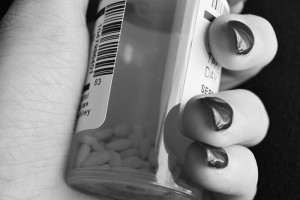 Anxiety is defined as a nervous disorder characterized by a state of excessive uneasiness and apprehension, typically with compulsive behavior or panic attacks. Depression is defined as an illness that involves the body, mood, and thoughts that affects the way a person eats, sleeps, feels about him or herself, and thinks about things. Both are categorized as “illnesses” or “disorders,” but what are they really? If someone is anxious, depressed, or both, what does that say about them?
Anxiety is defined as a nervous disorder characterized by a state of excessive uneasiness and apprehension, typically with compulsive behavior or panic attacks. Depression is defined as an illness that involves the body, mood, and thoughts that affects the way a person eats, sleeps, feels about him or herself, and thinks about things. Both are categorized as “illnesses” or “disorders,” but what are they really? If someone is anxious, depressed, or both, what does that say about them?
Psychology Today writer Jonathan Rottenberg says that the symptoms of depression are “Bewildering.” People who suffer from depression often seek help from a doctor or therapist. The fact that 27 million people are taking antidepressant medication might make depression seem like a real disease, but two thirds of people who take antidepressant medication still report some amount of depressive symptoms even after taking the medication.
Antidepressants have not improved much, even over the span of 60 years. Because doctors cannot pinpoint the exact cause of depression, “The search for a magic pharmacological bullet for depression verges on the quixotic,” Rottenberg said.
Anxiety occurs alongside depression so frequently that they are thought to be different types of the same disorder. Anxiety and depression are similar in structure; both have physical symptoms such as insomnia, muscle pain, headaches, and digestive disorders. Hara Estroff Marano, editor of Psychology Today, explains that in both anxiety and depression, the stress response system is overactive. “[People] literally can’t think straight,” She writes, “[They] ruminate over and over about the difficulties and disappointments [they] encounter until that’s all [they] can focus on.”
But are anxiety and depression really illnesses? Gregg Henrique, PhD and writer for Psychology Today, thinks this is not the case. Anxiety and depression are not illnesses in and of themselves, he explains, rather they are symptoms of an underlying cause. “If you break your arm… you don’t say ‘I have pain-in-my-arm disorder.’ The pain is a signal that there is a problem.”
 “Depression and anxiety are, for the large majority of cases, emotional signals that one’s psychological health is not ideal and that one’s psychosocial needs are not being met.” The source of the depression or anxiety often comes from a lack of relationships, such as friendships, romantic relationships, relationship with family, or another group, such as work.
“Depression and anxiety are, for the large majority of cases, emotional signals that one’s psychological health is not ideal and that one’s psychosocial needs are not being met.” The source of the depression or anxiety often comes from a lack of relationships, such as friendships, romantic relationships, relationship with family, or another group, such as work.
However, even people with healthy relationships in every area struggle with anxiety and depression. Henrique explains that there is more to psychological need than just relationships; meeting goals is another important part of our psychological health. When people do not meet these goals effectively, they feel depressed. Failure to meet one’s goals often makes people feel incompetent, which gives them a more negative view of themselves.
If someone is struggling with depression or anxiety, what is the best thing to do for them? Exercise is a good way to help both anxiety and depression. However, telling someone to exercise isn’t the best idea seeing as depression takes away any motivation to do so. The best thing someone can do is “Simply announce, ‘Let’s go for a walk,’ and accompany the person out the door,” Marano said.
If you or someone you know is feeling depressed or anxious, Sinclair has counseling services in Building 10, Room 424. You can call (937)-512-3032 to set up an appointment, or walk in from 3-4 p.m. on Monday through Friday. If you or someone you know are having suicidal thoughts or feelings, call the National Suicide Prevention Lifeline: 1-(800)-273-8255
Micah Karr
Reporter

